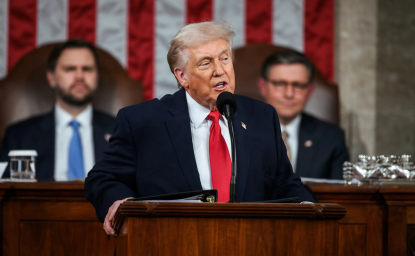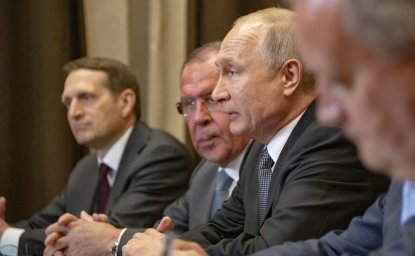Promoting Democracy
Promoting democracy has long been an important part of American foreign policy. Former Congressman Lee Hamilton discusses how we can improve our efforts.
Promoting democracy has long been an important part of American foreign policy. Former Congressman Lee Hamilton discusses how we can improve our efforts.
Today, U.S. policy seeks to promote democracy in Iraq, Afghanistan, and elsewhere. And though President Bush, like several presidents before him, has made democracy promotion a central tenet of his foreign policy, we are falling short. In fact, aside from some noteworthy successes that include post-war Japan, Germany, and South Korea, our deficiencies have been the rule, not the exception, in American democracy promotion.
This shouldn't be all that surprising, given the immense difficulty of the task. Democracy means much more than elections. It means building sustainable democratic institutions, inspiring popular confidence in those institutions, and championing transparency and accountability—unglamorous activities that demand long-term dedication and patience. Furthermore, it is a job our government—-with a crippled inter-agency process, a workforce lacking the necessary language and cultural knowledge, and facing a skeptical public—-is not well organized or equipped to perform.
Our shortcomings are on display in Afghanistan, where our cause is just, necessary, and legitimate. Nonetheless, casualties mount, the Taliban is resurgent, poppy production is at record levels, and the Karzai government holds little sway outside Kabul. And the difficulties we face in Iraq are even greater.
We were and are unprepared for these democracy-building efforts. They require not only skilled soldiers, but also agricultural and public health experts, legal experts, teachers, NGOs, engineers, and even anthropologists, all of whose knowledge must be transferred with sensitivity to those yearning for human and national dignity. We cannot dictate this process with an "our way or the highway" mindset.
Calls for democratic reform often conflict with defending other national interests. Pro-democracy rhetoric is seen as threatening by many of our autocratic allies. Pervez Musharraf (Pakistan), Hosni Mubarak (Egypt), and King Abdullah (Saudi Arabia) are both undemocratic leaders and partners, and our unwavering support for them undermines our commitment to advancing liberty and exposes us to charges of hypocrisy.
The U.S. may need to maintain these alliances while simultaneously encouraging gradual and pragmatic reform. Especially when the going is tough, we should not abandon the noble foreign policy objective of democracy promotion. We ultimately need allies who share our values-—not just our interests.
Thus, we must improve our democracy promotion efforts.
First, we must acknowledge how hard it is to plant and maintain a democracy in a country lacking the history or institutions of representative government. Elections and democracy are not one and the same. A true democracy has strong political institutions, a robust judiciary, some form of market economy, a free press, the participation of women and minorities, and the development of civil society—-all of which require patience, diligence, and skill to develop. Supporting democracy means not just recognizing the dignity of all individuals, but building the institutions necessary to sustain it.
Second, we must organize, bolster, and better coordinate the efforts of the executive agencies responsible for democracy promotion. Efforts are underway in the State Department, the Defense Department, USAID, and several other agencies, in addition to NGOs, to play more effective roles, but we still lack adequate organization and management, and have a long way to go. The President should appoint a strong representative to guide the execution of a comprehensive and integrated democracy promotion strategy.
Clearly, qualified people on the ground are indispensable. This month marks the fiftieth anniversary of Sputnik's launch, which inspired the National Defense Education Act. Tens of thousands of American students learned Russian, studied Russian history and culture, and met America's need for an educated citizenry that could combat our Cold War foe. We have not made a similar investment in our citizenry to promote democracy, and we will not succeed until we do.
Finally, America's greatest tool in democracy promotion is our example. As Thomas Jefferson said, "We are pointing out the way to struggling nations who wish, like us, to emerge from their tyrannies."
America's democratic experiment has been, despite its many flaws, a monumental success, inspiring individuals throughout the world. We must redouble efforts to strengthen our democracy at home and to project democratic values to the world, even in the face of threats to the homeland.
Ours is a nation blessed with a durable constitution, enormous resources, a free, energetic, and capable people, and an open and democratic society. History is on the side of the spread of democracy. It reflects the cherished values and ideals of our nation, which our people want to promote.

